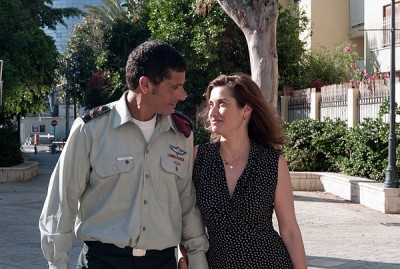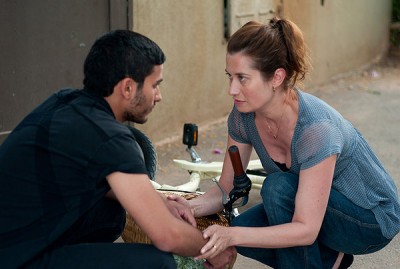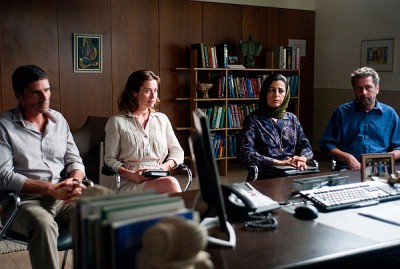
Lorraine Levy’s The Other Son is something of an oddity — not in the least because it’s shamelessly contrived and old-fashioned, yet compelling all the same. When I read the film’s stacked deck premise, I groaned inwardly. The whole infants-switched-at-birth schtick that propels the movie is — to borrow a phrase — so far over the hill that it’s below sea-level. The kicker that one infant is Israeli and the other Palestinian — is a full-on head-slapper of “Oy gevalt!” proportions. Throw into the mix the fact that Levy (whose work I’m unfamiliar with) shoots the film in a kind of 1950s Hollywood style — right down to some dubious process work in scenes where people are driving — makes it seem even more peculiar. (And, no, there’s nothing ironic or referential about the style.) But the simple fact is that the film still sucks you into its characters and story — or it did me anyway. Any movie where I decide to check the time and am shocked to find that it’s almost over must be doing something right.

While I can’t deny there’s a good deal about The Other Son that feels a little bit false — especially, a last minute bout of arbitrary melodrama — and even more facile, the main characters are so likable that it’s almost impossible not to empathize with them and want to know how things will work out. Similarly, some of the issues the film raises are interesting in themselves. The whole thing is set in motion when the blood test for Joseph Silberg’s (Jules Sitruck) induction into the Israeli Army reveals that his father, Alon Silberg (Pascal Elbé), cannot possibly be his father. That, of course, raises issues about his mother’s (Emmanuelle Devos) fidelity, but it turns out that Joseph is in fact the son of a Palestinian couple — Said (Khalifa Natour) and Leila Al Bezaaz (Areen Omari) — while the child they raised, Yacine (Mehdi Dehbi), belongs to the Silbergs. The mix-up occurred during an air raid that found the infants exacuated from a hospital and then returned to the wrong mothers.

To say the least, this would be awkward under any circumstances, but when the people involved are as divided as this, it goes way beyond that and into the realm of potentially catastrophic. And aspects of it do lean in that direction, especially concerning Yacine’s brother, Bilal (Mahmood Shalabi), who comes to regard Yacine as suddenly being the “enemy.” Similarly, Joseph finds himself cast adrift by the faith he was raised in since his actual mother isn’t Jewish. For that matter, the fathers aren’t as easily sold on this new situation as the mothers seem to be. (Whether or not that has anything to do with the fact that they exist in a movie made by a woman director may or may not be beside the point, but the assured manner in which she deals with the two sons argues against it.) The film mirrors its situation in that it’s somewhat like walking through a minefield. That it manages to do so at all is admirable. That it does so as well as it does is actually pretty amazing. Rated PG-13 for a scene of violence, brief language and drug use.
The Fine Arts Theatre’s second film for this year’s Asheville Jewish Film Festival, The Other Son, plays at 7 p.m on Thu., May 2 with an encore performance at 1 p.m. Fri., May 3. For more info go to: www.ashevillejewishfilmfestival.com




Fantastic, uplifting film! Too bad real life so seldom has such happy endings.